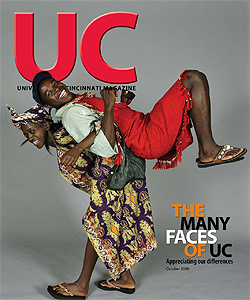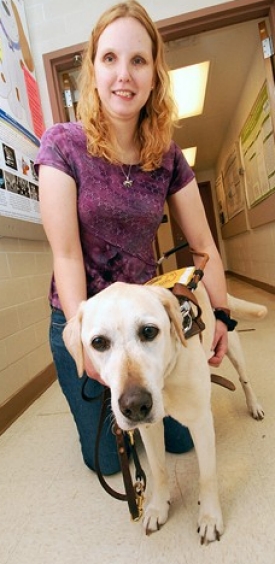Blind doctoral student sees career in listening to animals
by Katy Cosse
Shawn Makepeace saw her first dolphins when she was 10 years old -- two years after a series of operations on her eyes and seven years before she would be declared legally blind. But for one day at the Minnesota Zoo Aquarium, none of that really mattered.
"I must have stayed there and watched them for hours upon hours on end," she says. "I was just so mesmerized that I decided then and there that this was what I wanted to do. I want to study dolphins."
That determination stayed with Makepeace. She went on to earn her bachelor's degree in marine biology at the University of West Florida, study marine mammal cognition behavior in Mississippi and earn her master's degree in animal science with a minor in dolphin communications at the University of Connecticut.
While in Connecticut, she worked with Peter Scheifele, then professor-in-residence, as her thesis adviser. When Scheifele accepted a position at UC's College of Allied Health Sciences in 2007, Makepeace came to UC to get her PhD in communication sciences and disorders in hearing science, with an emphasis on animal bioacoustics.
She also joined Scheifele's work in the newly formed Facility for Education and Testing of Canine Hearing and Laboratory Animal Bioacoustics (FETCHLAB).
"The lab opened doors for me," she says. "I love dolphins, but it really opened me up to other animals, other animal bioacoustics and communication among dogs, rhinos and horses."
Coming to UC, however, required more than just filling out an application and finding an apartment. Makepeace had to have accessible classes and incorporate her guide dog, a friendly yellow lab named Sybil, into her life here.
The technical description for Makepeace's vision loss is "uveitis with complications due to diabetic retinopathy," but she can simplify it: "I'm not completely blind, but I can't see well, either."
Makepeace has had Type 1 diabetes since age 2. Without magnification, she can see colors and shapes; the closer an object is, the more details she can make out.
Each quarter, she meets with UC's Disability Services to figure out what she needs for each new class, from a closed–circuit TV for the FETCHLAB to a magnification program for her laptop.
With Cincinnati Association for the Blind mobility training and Sybil, she can get around UC and to and from her off-campus apartment.
"Sybil makes sure I get to class on time and safely," she says. "She pretty much goes wherever I go, but she gets to sleep during class."
In addition to her PhD coursework, Makepeace competes as a hunter/jumper with the UC Equestrian Team. This year, she acquired her own horse, currently stabled in Bethel, Ohio.
She started riding in Connecticut, after replying to an e-mail announcement about horseback riding lessons. "I've always loved horses, and I had never had a chance to do anything with them before," she says.
Though she says judging the depth of jumps can be tricky at times, her vision "has not really been a huge factor. My coach treats me just like everybody else," she says, "which is what I told her I wanted."
Makepeace credits her ambition to her parents, with whom she is very close. They live in her hometown of St. Louis, and she visits regularly.
"When I had all my health problems when I was little, they treated me like I was normal," she says. "If I had difficulties with my vision, they would just work it out and find a different way to do things.
"They supported me the entire way to where I am now. So I can do pretty much what everybody else does, just in a different way."
Makepeace didn't take much of a break this past summer, either. As a recipient of a University Research Council Summer Fellowship grant, she spent the season analyzing unusual echolocation data from a group of dolphins in Connecticut's Mystic Aquarium. "I love doing research," she says. "I love working with dolphins. I love trying to analyze the data, trying to figure out what the problem is and how to fix it."
When she finishes her doctoral work, she hopes to stay in academia, potentially teaching animal bioacoustics and doing research. For someone accustomed to meeting life's challenges head on, finding solutions seems a fitting line of work.

 Issue Archive
Issue Archive